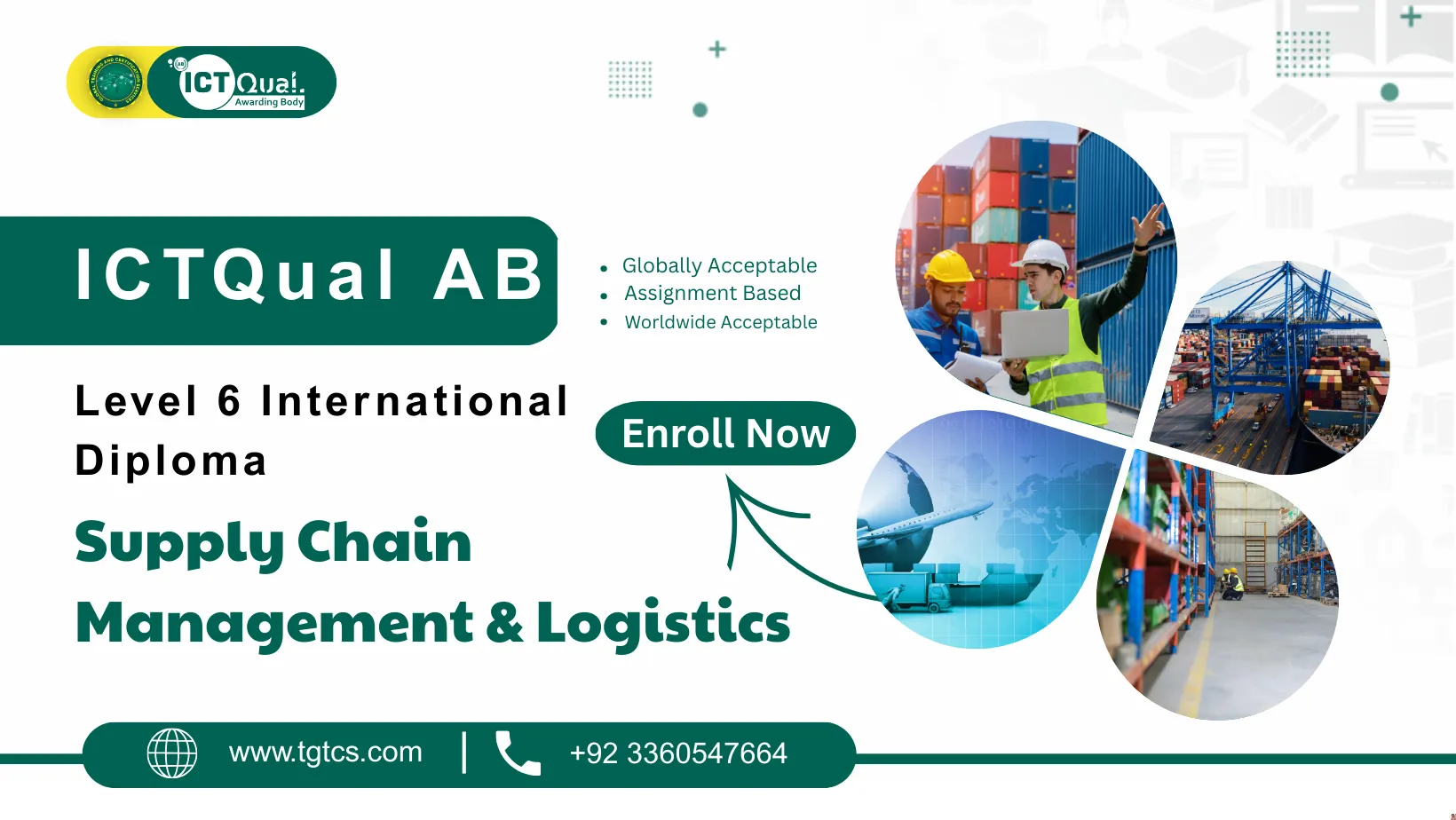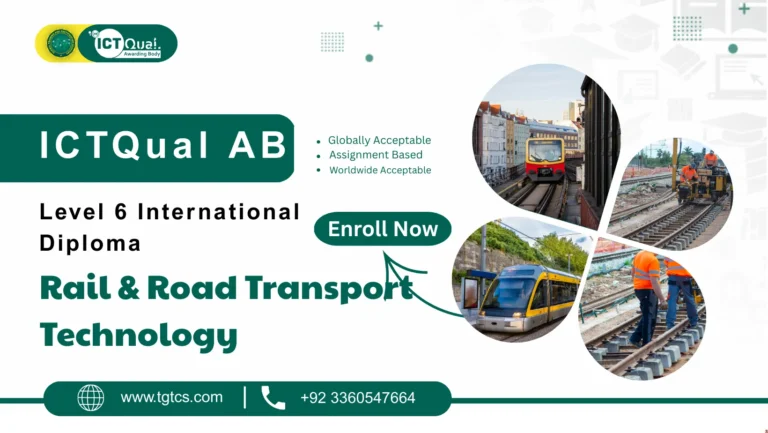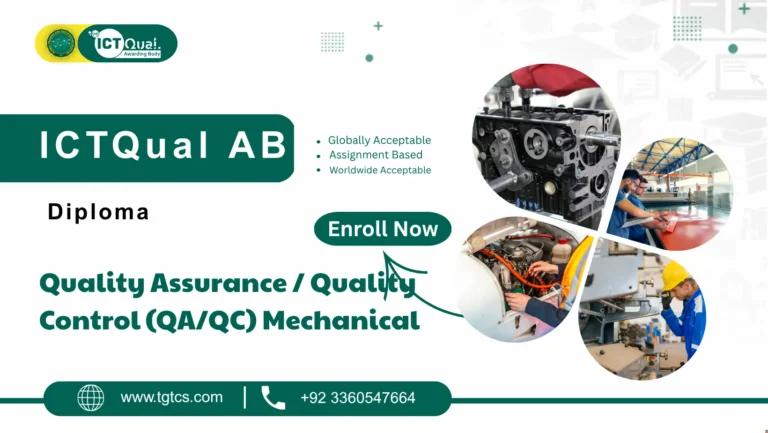ICTQual AB Level 6 International Diploma in Supply Chain Management and Logistics
In today’s fast-paced global economy, effective supply chain management and logistics are the backbone of successful businesses. Organizations worldwide depend on professionals who can design, manage, and optimize supply chain operations to ensure efficiency, cost-effectiveness, and sustainability. The ICTQual AB Level 6 International Diploma in Supply Chain Management and Logistics is a prestigious qualification designed to prepare learners for leadership roles in this dynamic field.
This 360-credit program provides a comprehensive understanding of global supply chain networks, logistics operations, procurement, inventory management, and transportation systems. It focuses on both theoretical knowledge and practical application, enabling learners to analyze challenges, implement innovative solutions, and improve organizational performance across industries.
Through this diploma, learners will develop advanced skills in strategic sourcing, risk management, logistics planning, warehouse operations, and supply chain analytics. The program also emphasizes sustainability, digital transformation, and the integration of technology such as AI, blockchain, and automation within modern supply chain systems.
The ICTQual AB Level 6 International Diploma in Supply Chain Management and Logistics is fully assignment-based, allowing participants to study at their own pace from anywhere in the world. Recognized internationally, it is British Council verifiable, MOFA and Embassy attested, and valued for career growth, job placement, and iqama approval in Gulf countries.
By completing this diploma, learners will gain the expertise to pursue rewarding careers in supply chain management, logistics, procurement, distribution, and operations. Whether aspiring professionals or experienced practitioners, this program equips individuals with the knowledge, skills, and global recognition needed to succeed in today’s competitive logistics and supply chain industry.
The Global Training and Certification Services is Approved Training Centre of ICTQual AB UK Ltd
Course Level and Credits
- Level 6 International Diploma, 360 credits.
- Suitable for professionals, logistics specialists, and students aiming for advanced knowledge in supply chain and logistics management.
Mode of Study
- Fully assignment-based; learn at your own pace.
- Accessible worldwide, with flexible options for working professionals and international learners.
Global Recognition & Attestation
- British Council verifiable, MOFA and Embassy attested.
- Globally recognized for career advancement, employment, and iqama approval in Gulf countries.
Scope and Purpose
- Comprehensive coverage of supply chain management, logistics operations, procurement, and transportation systems.
- Emphasis on both theoretical concepts and practical applications in real-world logistics and global supply networks.
Skills and Knowledge Gained
- Expertise in procurement, warehouse management, inventory control, and global logistics.
- Advanced knowledge of risk management, supply chain analytics, sustainability, and technology integration (AI, blockchain, automation).
- Strong decision-making, leadership, and problem-solving skills for dynamic supply chain environments.
Career Benefits
- Opens opportunities in multinational corporations, logistics firms, manufacturing, retail, and distribution companies.
- Enhances employability in supply chain consultancy, operations management, procurement, and global trade sectors.
- Strengthens professional credibility for leadership roles in logistics and supply chain management.
Target Audience
- Professionals in logistics, procurement, and supply chain seeking career advancement.
- Business managers, entrepreneurs, and students aiming to build expertise in global supply chain operations.
- International candidates seeking British Council verifiable and embassy-attested qualifications.
Unique Selling Points (USPs)
- Flexible, self-paced study model with fully assignment-based assessment.
- Prestigious and globally recognized Level 6 diploma.
- Ideal for international career growth, job opportunities, and iqama approval in Gulf countries.
Mandatory Unit
This qualification, the ICTQual AB Level 6 International Diploma in Supply Chain Management & Logistics, consists of 36 mandatory units.
Year 1 – Foundation in Supply Chain Management & Logistics
- Introduction to Supply Chain Management
- Fundamentals of Logistics Operations
- Principles of Procurement and Sourcing
- Inventory and Warehouse Management
- Transportation and Distribution Management
- Business and Organisational Fundamentals
- Introduction to International Trade
- Supply Chain Technology and Systems
- Communication and Negotiation Skills in Logistics
- Introduction to Project Management
- Research Methods in Supply Chain Management
- Professional Ethics and Corporate Responsibility
Year 2 – Intermediate Supply Chain Management & Logistics
- Strategic Supply Chain Planning
- Advanced Procurement and Supplier Management
- Operations and Production Planning
- Risk Management in Supply Chains
- Quality Management and Compliance
- Global Trade and Customs Management
- Lean and Agile Supply Chain Techniques
- Logistics Information Systems (LIS)
- Leadership and Team Development
- Data Analysis and Performance Measurement
- Sustainability and Green Logistics
- Professional Development and Reflective Practice
Year 3 – Advanced Supply Chain Management & Logistics
- Global Supply Chain Strategy and Management
- Supply Chain Finance and Cost Control
- Advanced Logistics and Transportation Management
- Strategic Sourcing and Contract Management
- Supply Chain Analytics and Decision-Making
- International Supply Chain and Trade Law
- Innovation and Technology in Logistics
- Risk Assessment and Crisis Management
- Leadership in Supply Chain Organisations
- Project Management for Global Operations
- Research and Evidence-Based Practice in Supply Chain
- Capstone Project in Supply Chain Management & Logistics
The ICTQual AB Level 6 International Diploma in Supply Chain Management & Logistics is designed to equip learners with advanced knowledge, strategic insights, and practical skills essential for managing modern supply chain operations.
Year 1 – Foundation in Supply Chain Management & Logistics
Introduction to Supply Chain Management
- Understand the structure, components, and functions of global supply chains.
- Apply fundamental concepts to improve efficiency and responsiveness.
- Analyze the role of supply chain integration in business success.
- Evaluate key challenges and opportunities in supply chain management.
Fundamentals of Logistics Operations
- Understand logistics processes, including transportation, warehousing, and distribution.
- Apply best practices to streamline logistics workflows.
- Analyze logistics cost drivers and efficiency improvement methods.
- Evaluate the impact of logistics operations on overall supply chain performance.
Principles of Procurement and Sourcing
- Understand procurement processes and sourcing strategies.
- Apply supplier evaluation and selection techniques.
- Analyze procurement contracts and compliance requirements.
- Evaluate the role of procurement in cost savings and efficiency.
Inventory and Warehouse Management
- Understand inventory control models and warehouse operations.
- Apply stock management techniques to reduce waste and costs.
- Analyze warehouse layouts for efficiency and safety.
- Evaluate technologies used in modern inventory management.
Transportation and Distribution Management
- Understand the modes of transportation and distribution channels.
- Apply strategies to optimize freight and logistics costs.
- Analyze global transport challenges and regulatory frameworks.
- Evaluate distribution systems for speed, cost-effectiveness, and reliability.
Business and Organisational Fundamentals
- Understand basic principles of management, leadership, and organizational behavior.
- Apply decision-making and problem-solving skills in business contexts.
- Analyze organizational structures and their impact on supply chain efficiency.
- Evaluate the role of HR, finance, and operations in supporting supply chain functions.
Introduction to International Trade
- Understand the fundamentals of global trade systems and policies.
- Apply INCOTERMS, tariffs, and trade regulations in supply chain operations.
- Analyze the impact of globalization on logistics and procurement.
- Evaluate risks and opportunities in international trade.
Supply Chain Technology and Systems
- Understand the role of ERP, SCM, and WMS systems in logistics.
- Apply technology solutions to enhance supply chain visibility.
- Analyze trends such as AI, blockchain, and automation in supply chains.
- Evaluate the benefits of digital transformation in logistics.
Communication and Negotiation Skills in Logistics
- Understand the importance of effective communication in supply chains.
- Apply negotiation techniques for supplier and partner agreements.
- Analyze barriers to communication in cross-cultural logistics settings.
- Evaluate strategies for building collaborative supply chain relationships.
Introduction to Project Management
- Understand project management principles and frameworks (PMBOK/PRINCE2).
- Apply project planning and scheduling tools.
- Analyze supply chain projects for risk, cost, and time management.
- Evaluate the success of logistics and supply chain projects.
Research Methods in Supply Chain Management
- Understand basic research methodologies and data collection techniques.
- Apply qualitative and quantitative methods in supply chain studies.
- Analyze industry trends using evidence-based approaches.
- Evaluate the role of research in improving supply chain performance.
Professional Ethics and Corporate Responsibility
- Understand ethical challenges in supply chain management.
- Apply CSR principles to logistics and procurement activities.
- Analyze case studies on ethical supply chain practices.
- Evaluate the importance of transparency and accountability in global supply chains.
Year 2 – Intermediate Supply Chain Management & Logistics
Strategic Supply Chain Planning
- Understand strategic frameworks for long-term supply chain planning.
- Apply demand forecasting and capacity planning techniques.
- Analyze supply chain network designs for efficiency.
- Evaluate alignment of supply chain strategies with business goals.
Advanced Procurement and Supplier Management
- Understand advanced supplier relationship management models.
- Apply strategies for supplier collaboration and performance evaluation.
- Analyze risks in global sourcing and procurement.
- Evaluate cost reduction and value creation through supplier partnerships.
Operations and Production Planning
- Understand production scheduling and workflow optimization.
- Apply lean manufacturing and just-in-time (JIT) principles.
- Analyze capacity utilization in production environments.
- Evaluate the integration of operations with supply chain functions.
Risk Management in Supply Chains
- Understand common risks in logistics and supply chains.
- Apply risk assessment tools to identify vulnerabilities.
- Analyze case studies on disruptions and recovery strategies.
- Evaluate proactive measures for supply chain resilience.
Quality Management and Compliance
- Understand ISO standards and quality frameworks in supply chains.
- Apply quality control tools such as Six Sigma and TQM.
- Analyze compliance requirements in logistics operations.
- Evaluate continuous improvement practices in supply chain quality.
Global Trade and Customs Management
- Understand international customs laws and trade compliance.
- Apply procedures for customs clearance and documentation.
- Analyze the impact of tariffs and trade agreements on supply chains.
- Evaluate best practices in global trade operations.
Lean and Agile Supply Chain Techniques
- Understand lean and agile methodologies in supply chain design.
- Apply process improvement tools to enhance efficiency.
- Analyze case studies of lean and agile supply chain transformations.
- Evaluate the balance between cost efficiency and responsiveness.
Logistics Information Systems (LIS)
- Understand the role of IT in logistics management.
- Apply LIS tools for tracking, monitoring, and reporting.
- Analyze real-time data for better logistics decision-making.
- Evaluate the impact of LIS on supply chain visibility.
Leadership and Team Development
- Understand leadership theories relevant to supply chain management.
- Apply leadership strategies to motivate and develop logistics teams.
- Analyze the role of HR in team effectiveness.
- Evaluate leadership practices in multinational supply chain organizations.
Data Analysis and Performance Measurement
- Understand KPIs and performance metrics in supply chains.
- Apply data analysis tools to measure efficiency.
- Analyze logistics dashboards and reports for decision-making.
- Evaluate continuous improvement through performance tracking.
Sustainability and Green Logistics
- Understand sustainable logistics and green supply chain initiatives.
- Apply eco-friendly practices in transportation and warehousing.
- Analyze regulatory requirements for sustainability.
- Evaluate the impact of green logistics on cost and brand image.
Professional Development and Reflective Practice
- Understand the importance of professional growth in supply chain careers.
- Apply reflective models to evaluate personal performance.
- Analyze career pathways in supply chain and logistics management.
- Evaluate skills needed for global employability.
Year 3 – Advanced Supply Chain Management & Logistics
Global Supply Chain Strategy and Management
- Understand strategic frameworks for managing international supply chains.
- Apply global logistics models to complex environments.
- Analyze the impact of globalization on supply chain operations.
- Evaluate competitive strategies in multinational supply chains.
Supply Chain Finance and Cost Control
- Understand financial principles in supply chain operations.
- Apply cost control measures in logistics and procurement.
- Analyze the role of working capital and cash flow in supply chain finance.
- Evaluate tools for financial decision-making in supply chain management.
Advanced Logistics and Transportation Management
- Understand global logistics systems and transport optimization.
- Apply routing, scheduling, and fleet management techniques.
- Analyze challenges in multimodal transport networks.
- Evaluate logistics systems for efficiency and customer satisfaction.
Strategic Sourcing and Contract Management
- Understand sourcing strategies for competitive advantage.
- Apply contract management techniques in supplier relationships.
- Analyze legal and financial risks in sourcing contracts.
- Evaluate strategies for long-term sourcing success.
Supply Chain Analytics and Decision-Making
- Understand the role of big data in supply chain decision-making.
- Apply predictive analytics to demand forecasting and inventory control.
- Analyze data-driven insights for strategic planning.
- Evaluate the benefits of analytics for supply chain competitiveness.
International Supply Chain and Trade Law
- Understand legal frameworks governing global trade and supply chains.
- Apply trade laws and compliance standards to logistics operations.
- Analyze case studies of legal disputes in international supply chains.
- Evaluate the role of legal knowledge in mitigating supply chain risks.
Innovation and Technology in Logistics
- Understand the impact of emerging technologies on logistics.
- Apply AI, blockchain, and IoT in supply chain optimization.
- Analyze the benefits and challenges of digital transformation.
- Evaluate future trends in logistics technology.
Risk Assessment and Crisis Management
- Understand frameworks for supply chain crisis management.
- Apply tools for risk identification and assessment.
- Analyze case studies of global supply chain disruptions.
- Evaluate resilience-building strategies for organizations.
Leadership in Supply Chain Organisations
- Understand advanced leadership practices for logistics teams.
- Apply change management strategies in supply chain contexts.
- Analyze leadership challenges in global supply chain organizations.
- Evaluate the role of leaders in driving performance and innovation.
Project Management for Global Operations
- Understand project management in multinational supply chain settings.
- Apply scheduling, budgeting, and resource allocation in projects.
- Analyze risks in global logistics projects.
- Evaluate project outcomes through KPIs and performance reviews.
Research and Evidence-Based Practice in Supply Chain
- Understand advanced research methodologies for supply chain studies.
- Apply evidence-based research in logistics and procurement.
- Analyze industry trends using data-driven insights.
- Evaluate how research contributes to innovation in supply chains.
Capstone Project in Supply Chain Management & Logistics
- Understand how to integrate theory and practice in a comprehensive project.
- Apply strategic problem-solving to a real-world supply chain challenge.
- Analyze outcomes using research and evidence-based approaches.
- Evaluate solutions through professional presentation and reporting.
The ICTQual AB Level 6 International Diploma in Supply Chain Management and Logistics provides learners with advanced skills and global recognition to excel in the fast-growing logistics and supply chain sector.
Advanced Industry Knowledge
- Gain an in-depth understanding of supply chain strategies, logistics operations, and procurement management.
- Learn how to integrate international trade, transportation, and warehouse management effectively.
Practical Skills Development
- Acquire hands-on skills in supply chain technology, analytics, and risk management.
- Build expertise in project management and leadership for supply chain organizations.
Global Recognition and Career Growth
- Attested by British Council, MOFA, and Embassy, ensuring strong international credibility.
- Opens career opportunities in logistics firms, multinational corporations, and global trade organizations.
Flexible and Professional Learning
- Fully assignment-based with flexible self-paced study, ideal for working professionals.
- Accessible worldwide, making it suitable for learners balancing career and education.
Career-Oriented Benefits
- Enhance employability with skills in cost control, performance measurement, and sustainable logistics.
- Boost professional credibility for leadership positions in supply chain and logistics management.
By completing the ICTQual AB Level 6 International Diploma in Supply Chain Management and Logistics, learners will position themselves as competitive professionals, equipped with globally recognized expertise to drive efficiency, sustainability, and innovation in the logistics and supply chain industry.
The ICTQual AB Level 6 International Diploma in Supply Chain Management and Logistics is designed for ambitious individuals who want to advance their expertise and career in logistics, operations, and global supply chains. Below are the ideal learners who will benefit the most from this program:
Supply Chain and Logistics Professionals
- Professionals already working in supply chain, procurement, or logistics who want to upgrade their skills to a global standard.
- Those aiming for leadership roles in transportation, warehousing, or international logistics operations.
Entrepreneurs and Business Owners
- Managers seeking to improve efficiency in business operations through strategic supply chain management.
- Executives who wish to strengthen decision-making abilities in cost control, risk management, and global trade.
- Entrepreneurs running logistics, distribution, or trade-related businesses who want to optimize operations.
- Business owners looking to expand into international markets with effective supply chain strategies.
Recent Graduates and Aspiring Professionals
- Graduates aiming to enter the logistics and supply chain field with an advanced international qualification.
- Individuals aspiring to secure roles in multinational corporations or global supply chain organizations.
Career Changers and Working Professionals
- Professionals from other industries planning to transition into supply chain and logistics management.
- Individuals seeking a globally recognized qualification to improve employability and career growth.
By enrolling in the ICTQual AB Level 6 International Diploma in Supply Chain Management and Logistics, learners will gain the competitive advantage needed to thrive in today’s global logistics and supply chain industry.
Course Overview
Course Level
Level 6
Course Units
36 Units
Credits
360
Duration
3 years






